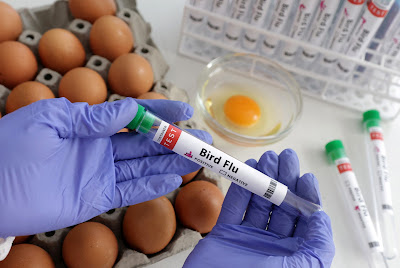In a surprising turn of events, a human case of bird flu has been reported in Colorado. The incident raised concerns among health officials and the public. Bird flu, also known as bird flu, is primarily a bird disease, but it can occasionally be transmitted to humans, leading to serious health problems. This article dives into the details of this case, the implications, and what you need to know to stay safe.
What is bird flu?
Bird flu is a viral infection that primarily affects birds, but can sometimes infect humans and other animals. The two main types of bird flu that affect humans are H5N1 and H7N9. These viruses can cause serious respiratory disease in humans and have a high mortality rate.
Transmission of bird flu to humans
Bird flu is spread to humans through direct or indirect contact with infected birds. This can happen by handling live or dead birds, touching contaminated surfaces, or inhaling particles from bird droppings. It is rare for bird flu to be transmitted from person to person, but it is possible under certain conditions.
The Colorado case
A recent case in Colorado involved a poultry worker who was exposed to infected birds. The individual developed symptoms consistent with bird flu and tested positive for the virus. The timeline of events includes initial worker exposure, onset of symptoms, and subsequent testing and isolation. Health authorities responded quickly and put measures in place to prevent further spread.
Symptoms of bird flu in humans
Early symptoms of bird flu can resemble those of the common flu, including fever, cough, sore throat and muscle aches. As the disease progresses, more severe symptoms such as breathing difficulties, pneumonia, and acute respiratory distress syndrome (ARDS) may develop.
Diagnostics and testing
Avian influenza is diagnosed using laboratory tests, including reverse transcription-polymerase chain reaction (RT-PCR) and viral culture. These tests help confirm the presence of the virus and determine the specific strain.
Treatment options
Treatment for bird flu usually includes antiviral drugs such as oseltamivir (Tamiflu) and zanamivir (Relenza). These medications can help reduce the severity of symptoms and shorten the duration of the illness if taken early. In severe cases, supportive care, including hospitalization and mechanical ventilation, may be necessary.
Preventive measures
Bird flu prevention includes both personal and public health measures. Individuals should avoid contact with sick or dead birds, practice good hand hygiene, and follow public health guidelines. Vaccination of poultry workers and people in high-risk areas can also help reduce the risk of infection.
Impact on the Community
The case in Colorado prompted a swift response from local authorities, including increased surveillance and biosecurity measures at poultry farms. Public reaction has been a mix of concern and curiosity, with many seeking more information about the virus and how to protect themselves.
Comparison of avian influenza with other influenza strains
Bird flu differs from seasonal flu in several ways, including transmission, severity, and mortality. While seasonal flu spreads easily between people and usually has a lower mortality rate, bird flu can cause more severe illness and has a higher mortality rate in infected individuals.
A global perspective
Human cases of bird flu have been reported in various parts of the world, including Asia, Africa and Europe. Each outbreak prompts an international health response, including travel advisories, increased surveillance, and research into vaccines and treatments.
Challenges in the fight against bird flu
Controlling avian influenza presents a number of challenges, including detecting and managing outbreaks in bird populations, developing effective vaccines, and educating the public. Scientific and medical challenges also include understanding virus mutations and transmission dynamics.
The role of vaccination
Vaccination plays a vital role in preventing bird flu. While poultry vaccines are available and widely used, the development of effective human vaccines is still ongoing. Scientists are working to create vaccines that can protect against multiple strains of bird flu.
Conclusion
A human case of bird flu in Colorado highlights the importance of vigilance and preparedness in dealing with zoonoses. By understanding transmission, symptoms and preventative measures, we can better protect ourselves and our communities. Continued research and public health efforts are essential to control and prevent future outbreaks.
Frequently asked questions
Can bird flu spread easily between people?
Bird flu does not spread easily from person to person. However, close contact with an infected individual or contaminated surfaces can lead to transmission.
What should I do if I suspect bird flu?
If you suspect you have bird flu, seek medical attention immediately. Early diagnosis and treatment are essential for effective management of the disease.
Are there any long-term effects of bird flu?
While most people recover from bird flu, severe cases can lead to long-term health problems such as respiratory problems and organ damage.
How can I protect myself from bird flu?
Avoid contact with sick or dead birds, practice good hygiene and follow public health guidelines. Vaccination for at-risk individuals can also help.
Is there a bird flu vaccine?
There are currently no widely available vaccines against avian influenza in humans. However, research into the development of effective vaccines continues.
1720099713-0.jpeg)
.jpg)










0 Comments